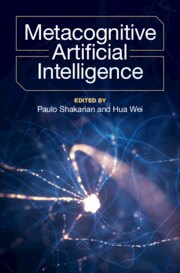Book contents
- Frontmatter
- Contents
- Contributors
- Acknowledgments
- Part I Introduction
- Part II Taxonomy of Metacognitive Approaches
- 2 An Architectural Approach to Metacognition
- 3 Metacognitive AI through Error Detection and Correction Rules
- 4 Mutual Trust in Human–AI Teams Relies on Metacognition
- Part III Neuro-Symbolic Models in AI
- Part IV Metacognition with LLMS
- Part V Metacognition in Learning Agents
- Part VI Assured Machine Learning in High-Stakes Domains
- Part VII Metacognition as a Solution to Handle Failure
- Part VIII Applications of Metacognitive AI
4 - Mutual Trust in Human–AI Teams Relies on Metacognition
from Part II - Taxonomy of Metacognitive Approaches
Published online by Cambridge University Press: 08 September 2025
- Frontmatter
- Contents
- Contributors
- Acknowledgments
- Part I Introduction
- Part II Taxonomy of Metacognitive Approaches
- 2 An Architectural Approach to Metacognition
- 3 Metacognitive AI through Error Detection and Correction Rules
- 4 Mutual Trust in Human–AI Teams Relies on Metacognition
- Part III Neuro-Symbolic Models in AI
- Part IV Metacognition with LLMS
- Part V Metacognition in Learning Agents
- Part VI Assured Machine Learning in High-Stakes Domains
- Part VII Metacognition as a Solution to Handle Failure
- Part VIII Applications of Metacognitive AI
Summary
The long game of AI aims at developing agents that are progressively more human-like in an ever-growing number of facets. Such agents must be able to explain the causes and effects of events and attitudes of agents in their world, including their own attitudes. This state of affairs can only be brought about if the agents are endowed with metacognitive abilities. In this chapter, we highlight the importance of metacognition for modeling the phenomenon of trust. Specifically, we present the case for the interdependence of metacognition and mutual trust between members of human-AI teams. We also argue that metacognition based on causality and contentful explanations requires knowledge support modeling human semantic and episodic memories as well as knowledge of language. We illustrate the above point with examples from systems developed using the OntoAgent cognitive architecture.
Information
- Type
- Chapter
- Information
- Metacognitive Artificial Intelligence , pp. 56 - 80Publisher: Cambridge University PressPrint publication year: 2025
